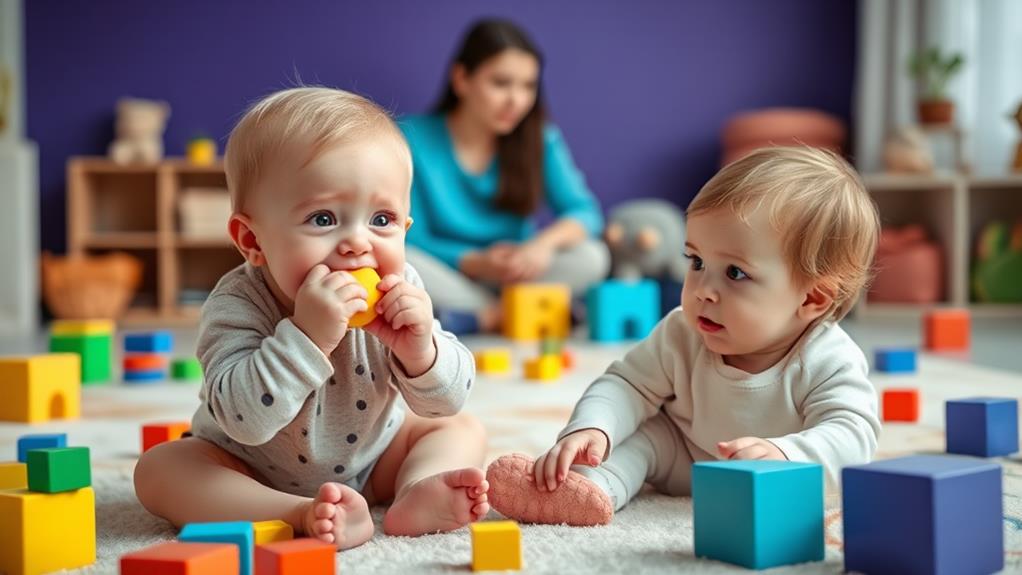Why Toddlers Bite & How To Stop Them
You might find yourself puzzled when your toddler suddenly bites, leaving you wondering what’s behind this seemingly aggressive behavior. It’s important to recognize that toddlers often lack the verbal skills to express their feelings, leading them to act out in frustration, excitement, or a quest for attention. Understanding the underlying reasons for biting is essential if you want to address it effectively. But before you can implement strategies to curb this behavior, you’ll need to explore the emotional triggers and social dynamics at play. Let’s uncover what drives this behavior and how you can respond effectively.
Understanding Toddler Behavior
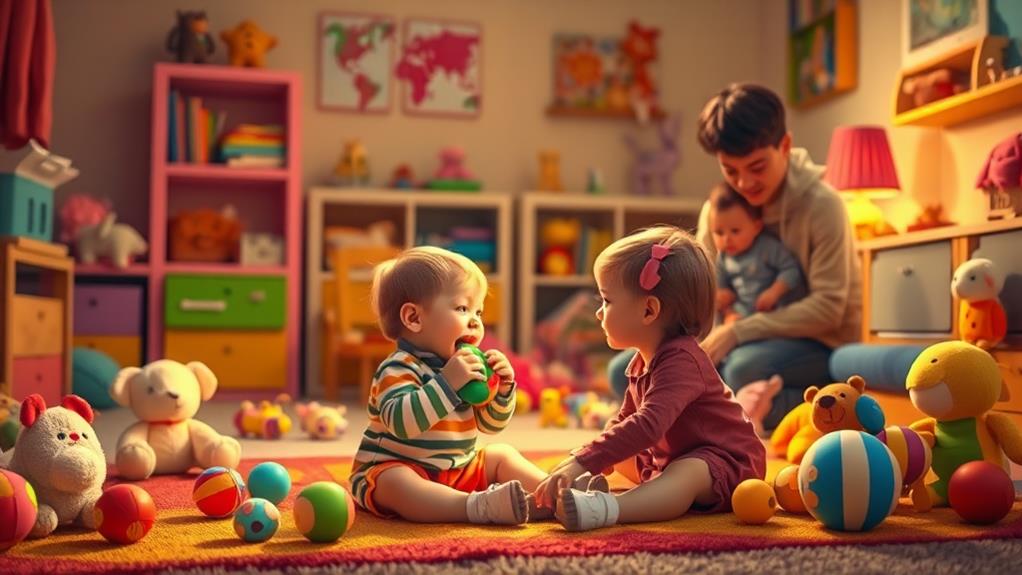
Understanding toddler behavior can feel like deciphering a complex code, especially when it comes to biting. You might wonder why your little one suddenly thinks they’re a tiny shark! It’s crucial to remember that toddlers are still learning how to express themselves, and their communication skills are limited.
Sometimes, they can’t find the words to tell you what they want or how they feel, so they resort to biting. Think of it as a toddler’s version of a dramatic exclamation mark! They might be excited, frustrated, or even seeking attention. Their emotions can be as big as their imaginations, but they lack the skills to handle them appropriately.
When you see your toddler bite, try to stay calm. Responding with anger or frustration won’t help; it might only confuse them more. Instead, use this moment to teach them about gentle touch and sharing. You can say something like, “We don’t bite; we use our words!”
This helps them understand that biting isn’t the right way to express their feelings. With patience and guidance, you can help them navigate their emotions and find more appropriate ways to communicate.
Common Reasons for Biting
Many toddlers bite as a reaction to specific situations or emotions. It can be surprising when your little one decides to use their teeth instead of their words!
One common reason for biting is frustration. When they can’t express what they want, it can lead to a meltdown, and sometimes, that frustration comes out as a bite.
Another reason is exploration. Toddlers are naturally curious and love to experiment with everything, including their own strength. They might bite to see how it feels or to get attention, even if it’s negative.
Speaking of attention, if they notice that biting gets a big reaction from you or others, they might think, “Hey, this works!”
Sometimes, they bite during play. If they’re excited or overstimulated, a quick nibble can happen in the heat of the moment.
Finally, teething can drive them to chomp down on anything available, including friends!
Understanding these common reasons can help you respond effectively. Instead of panicking, you can guide them toward more positive ways to express themselves or manage their feelings.
After all, toddlers are just learning how to navigate their world!
Emotional Triggers for Biting
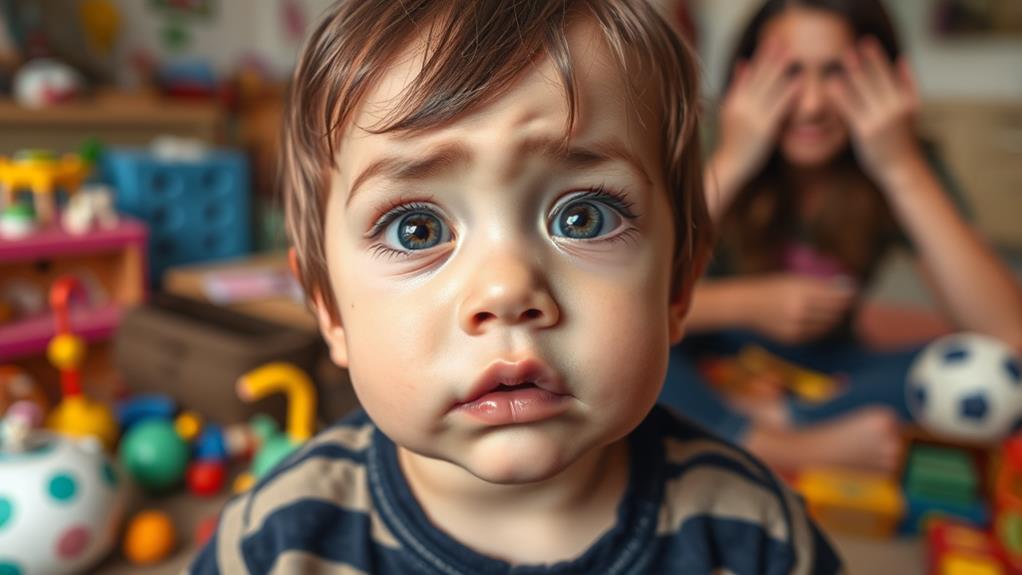
Emotions play a significant role in why toddlers bite, often serving as triggers in various situations. For little ones, feelings can sometimes feel overwhelming, and they don’t always know how to express them.
Visualize this: your toddler’s excited about a new toy but suddenly feels frustrated when someone else grabs it. That mix of joy and frustration can lead to a bite.
Sometimes, toddlers bite when they feel scared or anxious, especially in new environments. Imagine a crowded birthday party where everything’s loud and busy. Your child mightn’t understand what’s happening, and biting could feel like their only way to cope.
Don’t forget about jealousy! When they see you giving attention to another child, a bite might seem like the quickest way to bring back the spotlight. It’s not that they’re bad; they just lack the words to express what they’re feeling.
Understanding these emotional triggers can help you address the behavior calmly. When you notice your toddler’s emotions rising, step in with comfort and guidance.
This way, you can help them learn better ways to express themselves, like using words or even a hug!
Social Interactions and Biting
When toddlers interact with others, their social skills are still developing, which can lead to biting as a form of communication. They mightn’t have the words to express their feelings, so they resort to this surprising behavior. Imagine this: your little one sees a toy they want, but instead of asking, they take a nibble out of their friend’s arm. Yikes!
Biting often happens during playdates or group settings where excitement and frustration mix. Toddlers may feel overwhelmed by the presence of others, and in the chaos, they mightn’t know how to handle their emotions. It’s like a rollercoaster ride for them—thrilling but a little scary!
Sometimes, toddlers bite because they’re testing boundaries. They want to see how you and other caregivers react. If they notice a big reaction, even if it’s negative, they might think, “Hey, this gets attention!”
Effective Prevention Strategies
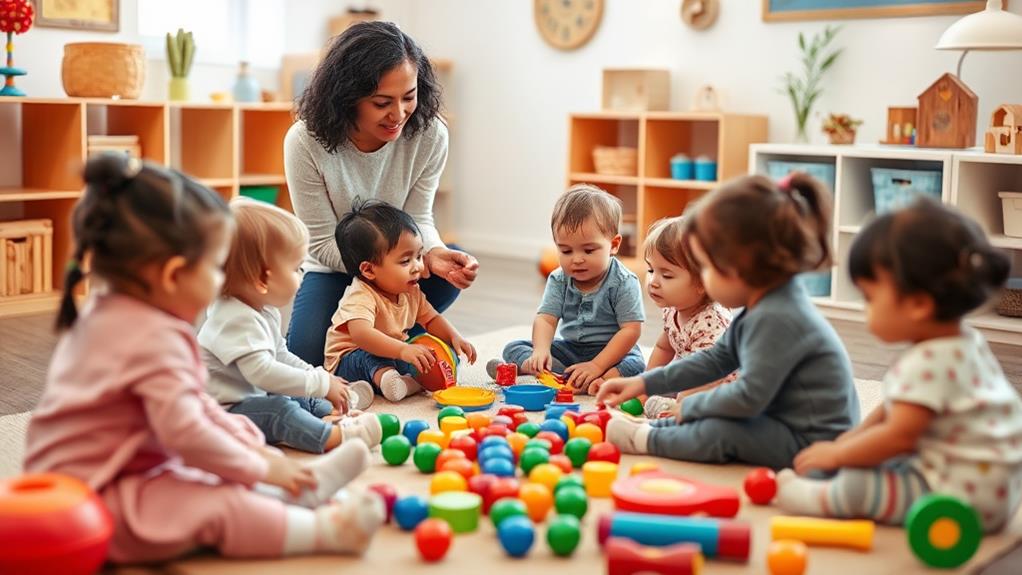
A proactive approach can make a significant difference in preventing biting among toddlers. First, keep an eye on your little one during playtime. Supervision helps you spot any potential conflicts before they escalate. If you notice tensions rising, step in and redirect their attention to a fun toy or game.
Next, teach your toddler about feelings. Help them understand that it’s okay to feel frustrated or angry, but it’s not okay to bite. Use simple phrases, like “Use your words, not your teeth!” This makes it clear that they’ve other options.
Also, create a calm environment. Toddlers often bite when they’re overstimulated or tired. Establishing a routine can help them feel secure and reduce those biting urges.
Positive Reinforcement Techniques
How can positive reinforcement help reduce biting in toddlers? It’s simple! When you catch your little one being kind or sharing toys, give them lots of praise. Kids thrive on attention and love. By rewarding good behavior, you’re teaching them that being nice feels good and gets noticed.
Try saying things like, “I love how you shared your toys with your friend!” This encourages them to repeat the behavior. You could even create a fun sticker chart. Every time they play nicely, they earn a sticker. Collect enough stickers, and they can choose a small reward. Who doesn’t love a good reward?
Also, remember that toddlers often bite out of frustration or anger. So, when they express their feelings in positive ways—like using words instead of teeth—give them a high-five! This way, they learn that communicating is a better choice than biting.
In short, use positive reinforcement to highlight good behavior. With time, patience, and lots of encouragement, you’ll notice a decrease in those pesky bites. Your toddler will learn that kindness is the way to go, and you’ll both be happier for it!
Addressing the Behavior Calmly

Addressing biting behavior calmly is vital for helping toddlers understand that it’s not acceptable. When your little one chomps down on a friend or sibling, it’s easy to feel frustrated or upset. But reacting with anger or panic can confuse them. Instead, take a deep breath and respond with a steady voice.
You might say something like, “Biting hurts. We don’t bite our friends.” This helps your child connect their action with the consequence, without feeling scared or anxious. It’s important to stay focused on the behavior, not the child. Remember, they’re still learning how to express themselves and manage their feelings.
Try to redirect their energy. Offer a toy or suggest a different activity when you see signs of frustration. Encouraging words can go a long way, too. When they play nicely or use words instead of teeth, give them a high-five or a cheer. Your calmness and positive reinforcement will show them the right way to handle their emotions.
In the end, patience is key. Biting is often just a phase, and with your gentle guidance, your toddler will learn to communicate without using their teeth.
When to Seek Professional Help
Recognizing the signs that might warrant professional help is essential for parents traversing the challenging waters of toddler behavior. If your little one’s biting seems more like a regular habit than an occasional phase, it might be time to contemplate seeking support.
Watch for patterns—like if they bite frequently, or if it escalates despite your best efforts to address it.
Another sign is if your toddler’s biting is causing serious injuries to themselves or others. If they’re biting out of frustration or anger, and you can’t seem to help them find better ways to express those feelings, that’s a red flag.
Also, if you notice other troubling behaviors, like extreme tantrums or withdrawal, don’t hesitate to reach out for help. It’s okay to admit when you need a little backup.
Consulting with a pediatrician or child psychologist can provide you with valuable insights and strategies.
Encouraging Healthy Communication
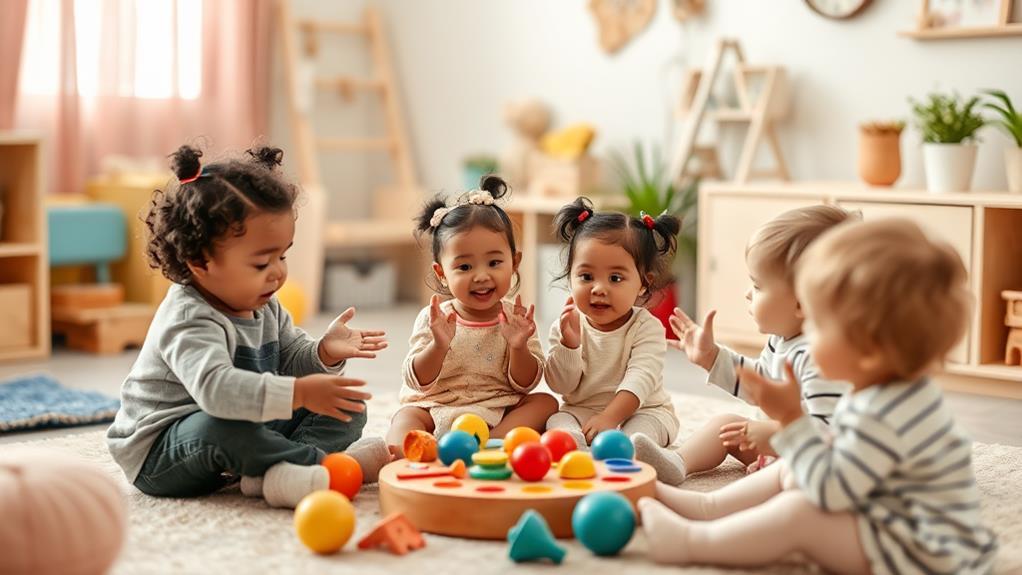
Creating an environment rich in communication is essential for helping your toddler express themselves without resorting to biting. Start by talking to your little one throughout the day. Describe what you’re doing, like, “Look! I’m mixing the pancakes!” This helps them learn new words and understand how to express their feelings.
Encourage your toddler to use words to express their emotions. If they’re frustrated or angry, gently prompt them to say, “I’m mad!” or “I need help!” This way, they’ll start realizing that words can be powerful tools instead of teeth.
Play games that promote sharing and taking turns. Simple activities like building blocks or playing catch can teach your child to wait for their turn and communicate when they want to play.
You can also read books together. Choose stories that highlight feelings and problem-solving. Ask questions like, “How do you think the character feels?” This encourages empathy and helps your toddler relate to others.
